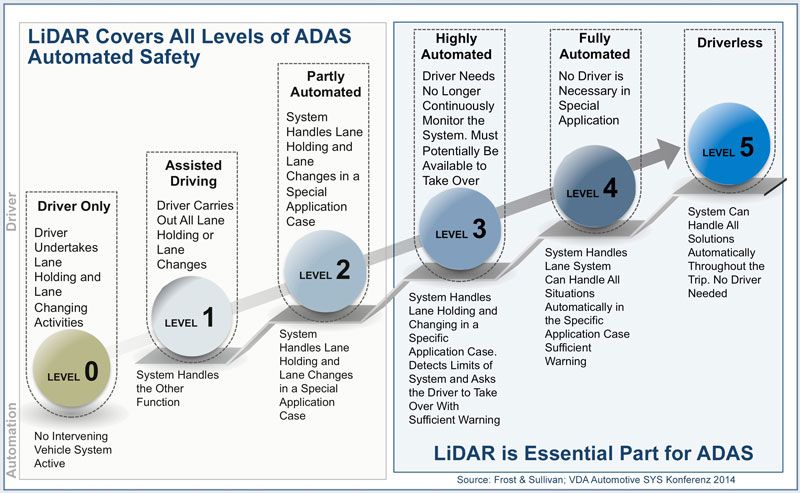
Robohub.org
Two LiDAR makers each get big funding
In anticipation of the need for LiDAR devices in cars with assisted steering and other self-driving technologies, both Velodyne and Quanergy received funding. Quanergy raised $90 million and Velodyne got $150 million.
As can be seen in the chart provided by Frost & Sullivan, LiDARs will play a big role in all phases of the emergence of self-driving vehicles. Hence the immediacy of these two investments in LiDAR technology.
Velodyne LiDAR, a Morgan Hill, Calif.-based provider of technology that allows self-driving cars see and avoid what’s around them, has raised $150 million in equity funding from Ford Motor Co. and Baidu. Velodyne expects an exponential increase in LiDAR sensor deployments in autonomous vehicles and ADAS applications over the next several years, driving high revenue growth. The funds will be used to help Velodyne lower the cost of their LiDAR to between $300 and $500, the price point at which mass adoption becomes practical.
“LiDAR continues to prove itself as the critical sensor for safe autonomous vehicle operation,” said David Hall, founder and CEO, Velodyne LiDAR. “This investment will accelerate the cost reduction and scaling of Velodyne’s industry-leading LiDAR sensors, making them widely accessible and enabling mass deployment of fully autonomous vehicles. We are determined to help improve the goal of safety for automotive vehicles as soon as possible, as well as empower the efficiency autonomous systems offer.”
“We want the cost to be low enough to be used for all cars. We envision a safer world for the millions of automotive drivers across the globe,” said Marta Hall, Velodyne President of Business Development.
Quanergy Systems Inc., a Sunnyvale, Calif.-based provider of solid state LiDAR sensors and smart sensing solutions, has raised $90 million. Backers include Sensata Technologies, Delphi Automotive, Samsung Ventures, Motus Ventures and GP Capital. Quanergy’s solid state LiDAR is included in the frontal piece of the Mercedes test car shown on the right. The solid-state nature of the LiDAR is a significant cost savings and the expected trade price (once full production begins) will be less than $250.
LiDARs aren’t the only components getting funded
In a NY Times story, Delphi and Mobileye said that they had formed a partnership to provide a core self-driving platform to automakers by the end of 2019.
The Mobileye-Delphi collaboration “will accelerate the time to market” and enable carmakers to produce vehicles capable of driving themselves “without the need for huge capital investments,” said Amnon Shashua, chairman and chief technology officer of Mobileye.
Delphi, the former parts division of General Motors, and Mobileye, an Israeli company known for producing the sensors and other technology that help cars recognize obstacles in the road, are both major component providers to the auto industry.
tags: Autonomous Cars, autonomous vehicles, c-Business-Finance, Delphi, Frank Tobe, LIDAR, MobilEye, The Robot Report




